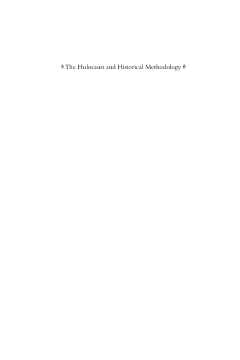
Additional Information
Book Details
Abstract
In the last two decades our empirical knowledge of the Holocaust has been vastly expanded. Yet this empirical blossoming has not been accompanied by much theoretical reflection on the historiography. This volume argues that reflection on the historical process of (re)constructing the past is as important for understanding the Holocaust—and, by extension, any past event—as is archival research. It aims to go beyond the dominant paradigm of political history and describe the emergence of methods now being used to reconstruct the past in the context of Holocaust historiography.
Dan Stone is Professor of Modern History at Royal Holloway, University of London. His recent publications include The Historiography of Genocide (ed., 2008), Histories of the Holocaust (2010), and The Oxford Handbook of Postwar European History (ed., 2012).
“Most of the thoughtful papers, by scholars in Britain, Germany, Canada, the US, Israel, and elsewhere, seek to put the Holocaust in a broad cultural European and even worldwide perspective. The pivotal figure is Saul Friedlander, whose acclaimed books on the Holocaust incorporated testimonies of the victims together with meticulous analysis of the methods of extermination. Another important theme focuses on historians' moral sensitivity to what is now recognized as a paradigmatic genocide, in relation to dispassionate scholarly objectivity in evaluating sources and the literary qualities of historical narrative. Far too sophisticated for most college students, the collection is for their teachers and for historians involved in the study of 20th-century European and Jewish history.” · Choice
“The Holocaust and Historical Methodology is an important and refreshing overview of recent and hopefully sustainable trends in theoretical approaches to the Holocaust. Its editor, Dan Stone, has assembled an impressive range of contributors, each bringing their own slant and biases to the representational challenges confronting the broad field of Holocaust studies… [It] is an intellectually enriching experience… [and] should be required reading for new generations of scholars… not all readers will agree with the contributors’ conclusions, but the book is sure to inspire fresh and much-needed directions in rethinking the Holocaust’s challenge to cultural memory, modes of historical writing, comparative spatio-temporal contexts, and global history.” · The Australian Journal of Politics & History
“…a very interesting and timely contribution to the study of the Holocaust by a younger generation of historians. Edited by historian Dan Stone, it is a collection of essays focusing on different aspects of the study of the Holocaust. Issues are raised not only in relation to the historiography of the Holocaust but also on the methodologies used by historians to grasp the series of events lumped together under the term Holocaust.” · Historein
“This volume of essays makes a valuable contribution to theory in a field thickly populated with empirical work. Well indexed and containing both informative notes and a superb bibliography of Holocaust historiography, it will be well used by both faculty and students.” · Histoire sociale/Social history
“Historians will find this volume a challenging, provocative, and wide-ranging collection. By explicating the complexities, controversies, and processes of understanding the Holocaust, it suggests implications for method and theory concerning other historical questions in other times and places.” · Canadian Journal of History/Annales canadiennes d'histoire
“Dan Stone has gathered an impressive collection of historians whose scholarship on the Holocaust spans a diversity of academic themes and methodological schools of thought… The authors in this volume make an important contribution to the discourse on how we study this event. As such, this work should be required reading for Holocaust students and scholars alike.” · Post Script
“This book is timely and necessary and often extremely challenging. It brings together an impressive cast of scholars, spanning several academic generations… Anyone interested in writing about the Holocaust should read this book and consider the implications of what is written here for their own work. There seems to me little doubt that Holocaust history writing stands at something of a cross roads, and the ways forward that this volume points to are extremely thought provoking.” · Tom Lawson, University of Winchester
